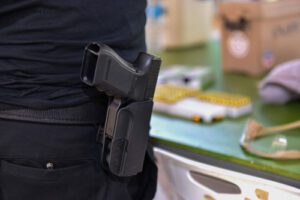 The Court finds that the challenged provisions have chilled Plaintiffs’ reasonable exercise of their Second Amendment right. For example, because Mr. Koons regularly meets for breakfast at restaurants that occasionally have liquor licenses, he now leaves his firearm at home. [See Koons Decl. ¶ 13.] Likewise, Mr. Gaudio, who testified to carrying a handgun when “conducting [his] everyday suburban activities”—such as, visiting Shop Rite and a movie theater as well as “attending a community event . . . at a YMCA camp”—now leaves his firearm at home because of the new restrictions. [Gaudio Decl. ⁋⁋ 9, 10, 16.] Similarly, Mr. Muller stated that he carried his handgun “most of the time”—at stores, friends’ homes, restaurants, parks, and other locations—but now feels as though he has “no choice but to stop carrying a handgun” outside of his own home and property. [Muller Decl. ¶¶ 9–11, 18.] Together, the new restrictions are so extensive and burdensome that they render Plaintiffs’ right to armed self-defense in public a nullity.
The Court finds that the challenged provisions have chilled Plaintiffs’ reasonable exercise of their Second Amendment right. For example, because Mr. Koons regularly meets for breakfast at restaurants that occasionally have liquor licenses, he now leaves his firearm at home. [See Koons Decl. ¶ 13.] Likewise, Mr. Gaudio, who testified to carrying a handgun when “conducting [his] everyday suburban activities”—such as, visiting Shop Rite and a movie theater as well as “attending a community event . . . at a YMCA camp”—now leaves his firearm at home because of the new restrictions. [Gaudio Decl. ⁋⁋ 9, 10, 16.] Similarly, Mr. Muller stated that he carried his handgun “most of the time”—at stores, friends’ homes, restaurants, parks, and other locations—but now feels as though he has “no choice but to stop carrying a handgun” outside of his own home and property. [Muller Decl. ¶¶ 9–11, 18.] Together, the new restrictions are so extensive and burdensome that they render Plaintiffs’ right to armed self-defense in public a nullity.
Furthermore, the Court rejects Defendants’ view that Plaintiffs “cannot show irreparable harm just by alleging Second Amendment injury.” [State’s Br. at 19.] Defendants argue that, under Third Circuit precedent and other circuit court decisions, the Court may not rely upon a constitutional deprivation alone to satisfy the irreparable harm prong for injunctive relief. [Id. at 18–19.] The Court disagrees.
At oral argument and in their papers, Plaintiffs convincingly explain that these cases do not involve an ongoing injury that can be remedied by injunctive relief only. [Tr. at 9091; Pls.’ Reply at 14.] Plaintiffs’ right to carry a firearm in public for self-defense can be restored only by enjoining implementation of the challenged provisions.
It is likely that making the right to armed self-defense in public a nullity was the true motivation for the legislation at issue. The Bruen majority appears to have anticipated this sort of response from certain legislatures. The number of times that Judge Bumb cited to Bruen is a testament to this.
